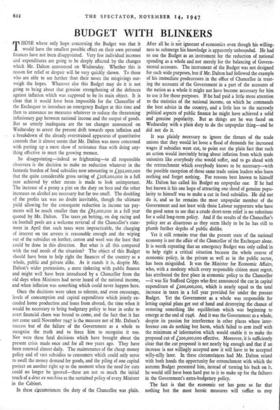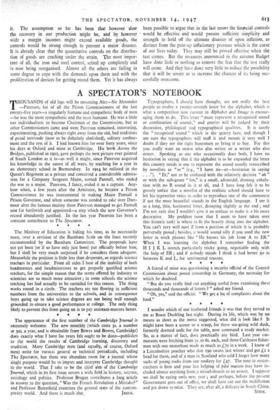BUDGET WITH BLINKERS
THOSE whose only hope concerning the Budget was that it would have the smallest possible effect on their own personal finances have not been disappointed. Very few individual incomes and expenditures are going to be deeply affected by the changes which Mr. Dalton announced on Wednesday. Whether this is reason for relief or despair will be very quickly shown. To those who are able to see further than their noses the misgivings out- weigh the hopes. Whatever else this Budget may do it is not going to bring about that genuine strengthening of the defences against inflation which was supposed to be its main object. It is clear that it would have been impossible for the Chancellor of the Exchequer to introduce an emergency Budget at this time and then to announce no measures whatever to reduce the threatening inflationary gap between national income and the output of goods. But so utterly inadequate are the tax changes announced on Wednesday to arrest the present drift towards open inflation and a breakdown of the already overstrained apparatus of quantitative controls that it almost seems that Mr. Dalton was more concerned with putting up a mere show of resistance than with doing any- thing effective to meet the growing menace.
So disappointing—indeed so frightening—to all responsible observers is the decision to make no reduction whatever in the fantastic burden of food subsidies now amounting to £392,000,000 that the quite considerable gross saving of f208,000,000 in a full year achieved by other means is made to look unimportant. The increase of a penny a pint on the duty on beer• and the other increases on alcohol are necessary but far too small. The doubling of the profits tax was no doubt inevitable, though the ultimate yield allowing for the consequent reduction in income tax pay- ments will be much smaller than the £85,000,000 in a full year quoted by Mr. Dalton. The taxesyn betting, on dog racing and on football pools are a welcome reversal of the Chancellor's state- ment in April that such taxes were impracticable, the charging of interest on tax arrears is reasonable enough and the wiping out of the subsidies on leather, cotton and wool was the least that could be done in this direction. But what is all this compared with the real needs of the situation? The object of this Budget should have been to help right the finances of the country as a whole, public and private alike. As it stands it is, despite Mr. Dalton's wider pretensions, a mere tinkering with public finance and might well have been introduced by a Chancellor from the old days when Ministers had never heard of the national income, and when inflation was something which could never happen here.
Once the decisions were taken to tolerate, and even encourage, levels of consumption and capital expenditure which jointly ex- ceeded home production and loans from abroad, the time when it would be necessary to bring budgetary policy to bear in order to avert financial chaos was bound to come, and the fact that it has not come until November 1947 is the measure not of Mr. Dalton's success but of the failure of the Government as a whole to recognise the truth and to force him to recognise it too. Nor were these fatal decisions which have brought about the present crisis made once and for all two years ago. They have been renewed almost daily. The maintenance of the cheap money policy and of vast subsidies to consumers which could only serve to swell the money demand for goods, and the piling of one capital project on another right up to the moment when the need for cuts could no longer be ignored—these are not so much the initial touch of a deus ex machina as the sustained policy of every Minister in the Cabinet.
In these circumstances the duty of the Chancellor was plain. After all he is not ignorant of economics even though his willing- ness to submerge his knowledge is apparently unbounded. He had to use the Budget as an instrument for the reduction of national spending as a whole and not merely for the balancing of Govern- mental accounts. The instrument of the Budget was not designed for such wide purposes, but if Mr. Dalton had followed the example of his immediate predecessors in the office of Chancellor in treat- ing the accounts of the Government in a part of the accounts of the nation as a whole it might not have become necessary for him to use it for those purposes. If.he had paid a little more attention to the statistics of the national income, on which he commands the best advice in the country, and a little less to the narrowly political aspects of public finance he might have achieved a solid and genuine popularity. But as things are he was faced on Wednesday with a plain duty to do the unpopular thing—and he did not do it.
It was plainly necessary to ignore the threats of the trade unions that they would let loose a flood of demands for increased wages if subsidies were cut, to point out the plain fact that such an action would inevitably bring about inflation from which trade unionists like everybody else would suffer, and to go ahead with the retrenchment which everybody knows to be necessary—with the possible exception of• those same trade union leaders who learn nothing and forget nothing. For reasons best known to himself Mr. Dalton has called his Budget an unpopular one. If he had but known it his one hope of attracting one shred of genuine popu- larity to himself was to make a cut in food subsidies. He did not do it, and so he remains the most unpopular member of the Government and not least with those Labour supporters who have the good sense to see that a crude short-term relief is no substitute for a solid long-term policy. And if the results of the Chancellor's policy are as disastrous as they seem likely to be he has still to plumb further depths of public dislike.
Yet it still remains true that the present state of the national economy is not the affair of the Chancellor of the Exchequer alone. It is worth repeating that an emergency Budget was only called in to help right a critical situation because the whole course of economic policy, in the private as well as in the public sector, has been misguided. It was the Minister for Economic Affairs, who, with a modesty which every responsible citizen must regret, has attributed the first place in economic policy to the Chancellor —it was Sir Stafford Cripps who first announced the cut in capital expenditure of £200,000,000, which is nearly equal to the total increase in taxes in a full year provided for under the present Budget. Yet the Government as a whole was responsible for letting capital plans get out of hand and destroying the chance of restoring something like equilibrium which was beginning to emerge at the end of 1946. And it was the Government as a whole, despite its passion for interference in other places where inter- ference can do nothing but harm, which failed to arm itself with the minimum of information which would enable it to make the proposed cut of £200,000,000 effective. Moreover, it is sufficiently clear that the cut proposed is not nearly big enough and that if an increase is not willingly accepted now it will have to be accepted willy-nilly later. In these circumstances had Mr. Dalton seized with both hands the opportunity for retrenchment with which the autumn Budget presented him, instead of turning his back on it, he would still have been hard put to it to make up for the failures in the Government's extra-budgetary policy.
The fact is that the economic rot has gone so far that nothing but the most heroic measures will suffice to stop it. The assumption so far has been that however slow the recovery in our production might be, and by however wide a margin incomes might exceed available goods, the controls would be strong enough to prevent a major disaster. It is already clear that the quantitative controls on the distribu- tion of goods are cracking under the strain. The most impor- tant of all, the iron and steel control, seized up completely and is now being reorganised. Almost all the others are failing in some degree to cope with the demands upon them and with the proliferation of devices for getting round them. Yet it has always been possible to argue that in the last resort the financial controls would be effective and would possess sufficient simplicity and strength to hold off the ultimate disaster of open inflation, as distinct from the pent-up inflationary pressure which is the curse of our lives today. They may still be proved effective when the test comes. But the measures announced in the autumn Budget have done little or nothing to remove the fear that the test really will come. And they have done very little to reduce the possibility that it will be severe or to increase the chances of its being suc- cessfully overcome.































 Previous page
Previous page